VIENNA // Brent futures surged more than 6 per cent to $53.68 per barrel on Thursday on news of the Opec agreement here. The agreement was much stronger than analysts had expected and could remove 1.8 million barrels per day from the market if things go to plan.
But an Iraqi delegate told The National that is a "big if", especially with the Opec end of the agreement relying on the delivery of 600,000 bpd of non-Opec production cuts, half of which Moscow committed by phone during the Vienna deliberations, according to the organisation's president, Mohammad bin Saleh Al Sada, Qatar's minister of energy and Industry.
In 2002, Russia promised to reduce production alongside Opec to boost prices, but failed to honour its pledge.
Russian journalists attending this week's Vienna meeting said that while Moscow had never delivered cuts to help Opec, this time might be different. The Russian president, Vladimir Putin, has seen only too well the effect the low oil price has had on his budget and sent his energy minister, Alexander Novak, out in the spring to lead the way in brokering an agreement ahead of the emergency Opec meeting in Doha.
That initiative failed because Saudi Arabia was still at loggerheads politically with Iran, which refused to join any accord until they restored production to levels before the UN sanctions were imposed.
This time the Saudis have been much more accommodating in going along with an Iranian quota which is actually above current production. Iran notionally cut to 3,797,000 bpd from 3,975,000 bpd, but it has been “producing” out of storage to lift its claim to 4 million bpd in October, the month on which the cuts agreement is based. Most analysts put Iranian output at 3.7 million bpd in the reference month.
Saudi Arabia’s oil minister, Khalid Al Falih, knows the Iranian quota will be irrelevant for some time because Tehran now needs to invest in new capacity to boost actual production, a long process requiring drilling and reservoir rehabilitation.
In fact, the whole process may be postponed if Donald Trump reimposes sanctions on Iran in the new year. The Republican-controlled Congress is chafing at the bit to reimpose strictures on Tehran, even though this may counterproductively bring Iran’s Republican Guard out of the woodwork to prominence again.
A big factor in the Saudi volte face from price warrior back to price defender is the forthcoming IPO of Saudi Aramco. If oil is firm and stable for a period ahead of Aramco's going public, the new issue may raise twice as much money because the pricing of the shares will be at loftier levels and the institutional and retail demand for participation will be much greater.
Riyadh has also been feeling the revenue pinch of crude prices, which went into the $20s at the outset of this year when it was intransigent about all Opec and Russia participating in any cuts to which it has agreed..
Holding producers’ feet to the fire has probably paid off, however. Mr Putin has felt the pain not only in oil revenues but also through natural gas prices, which in many cases are tied to petroleum postings. He has to think well in advance of restoring Russian economic activity from currently depressed levels to a solid recovery, which will ensure his re-election as president.
There also seems to be a back door through Iran in ensuring Russian participation in the producer cuts. It seems likely that Opec will be able to get agreement on paper on December 9 to the promised Russian contribution and another 300,000 bpd of non-Opec cuts.
After that, the resurrected ministerial monitoring committee headed by Kuwait will be using tanker trackers like Petro-Logistics of Geneva and other independent sources to monitor an agreement that all the producers desperately hope will hold prices above $50 per barrel. The alternative if the agreement falls apart before the next Opec meeting on May 25 is petroleum back in the $30s with the huge 3 billion barrel OECD inventory overhanging the market like the Sword of Damocles.
Jim Crawford is the managing director of Sharjah-based Inter Emirates General Trading Company
business@thenational.ae
Follow The National's Business section on Twitter

